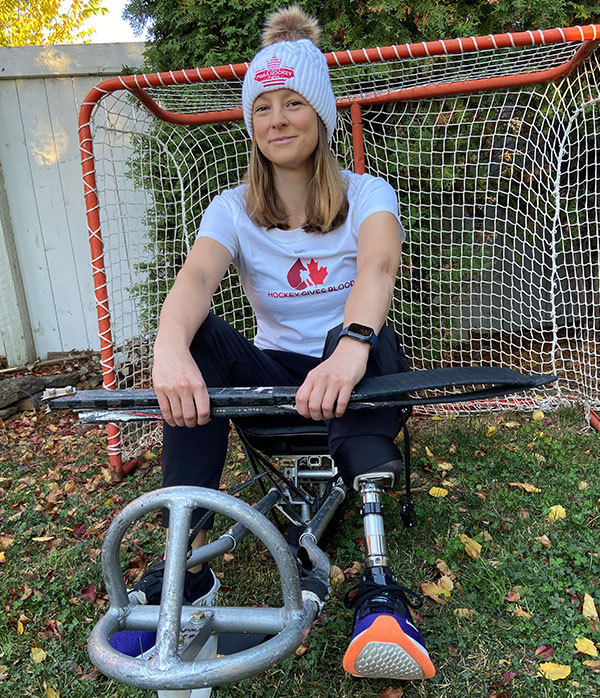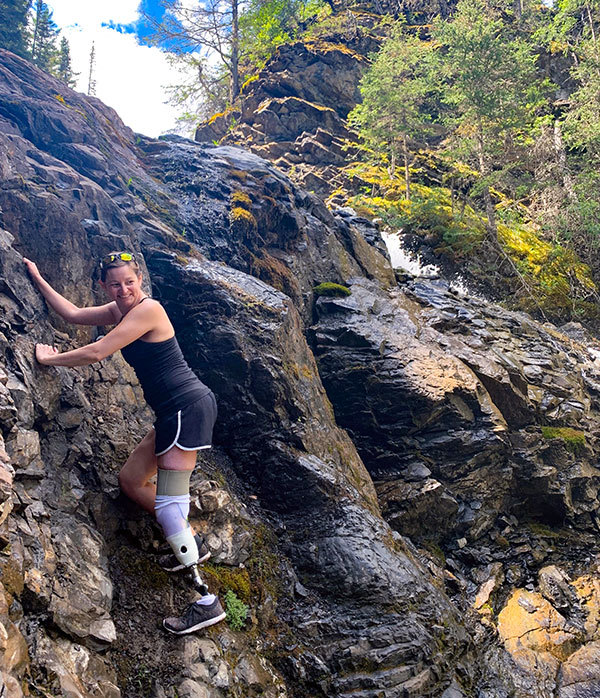Alicia Souveny lost her left leg in a car accident one winter morning in 2019 and would have lost her life, too, had she not received enough blood in time from donors. Since then, she has been an ambassador for the Canadian Blood Services, encouraging people to donate blood that can save lives. When she’s not working as a physiotherapist in Edmonton, she loves to stay active and plays on the national women’s para-hockey team.
I reached out to Alicia after coming across her story on the Canadian Blood Services website. She agreed to share details of her accident, what it’s like to live with a physical disability, and how she now approaches the world differently because of it.
Do you have a vivid memory of the morning you were in that accident?
So, I don’t remember any of it. I can’t even tell you what my last memory was. Maybe I remember brushing my teeth that morning, or I just know I did. My first memory after the accident occurred about a month later, after I was out of the ICU (Intensive Care Unit). I was unconscious at first, but slowly I started to do things like mimicking people’s expressions. If they smiled, I’d smile. Or if they made sad faces, I’d make sad faces. Then I progressed to saying some words. The first month is kind of weird because people tell me about memories they have of me during that time, but I don’t remember any of it myself. But I think I’m lucky that I don’t remember much because it would have been traumatic.
What role did blood donations play in this whole process?
One of the important parts of my story is that when the ambulance picked me up, they immediately gave me blood before doing any testing to see what blood type I have. So, they give O-negative blood to people in that situation because it’s the one that everybody can have and nobody will react to. That’s why Canadian Blood Services really encourages O-negative people to donate their blood, which can be used in these emergencies. It turned out that it is my blood type, so they had to give me more O-negative blood. I received a lot of units after the accident and with the emergency surgeries that followed. So, a lot of people helped save my life. Since they’re all anonymous, I don’t know who they are, but I really appreciate it.
Talk more about how you began to encourage people to donate blood. Has there been a time when someone was unsure, but then your story convinced them otherwise?
I’ve always believed in donating blood. After I had my accident, people were asking what they could do to help. My family started telling people that they could donate blood because I needed a lot of blood. So, people started donating blood in my name, which was super cool. Even my partner had never donated before my accident, which made him realize the importance. You just never know when it’s going to hit somebody you care about, like when somebody you love is going to need that blood.
What were some challenges you faced while recovering and gradually getting back into sports?
I’ve always loved playing sports. It’s always been a bit of an escape for me because I feel like when you’re in the middle of a game, you’re not thinking about other things. Or if you’re swimming, you’re just focused on swimming, right? So, one of the first things I got back to was swimming. Being in the water was nice because there’s a feeling of weightlessness and it’s less noticeable that I don’t have a leg. Obviously, it’s a little slower, especially if I’m just kicking and not using my arms.
It was also great because the disability community is tight-knit and once you get into one sport within that community, you’ll meet people that will connect you with a whole bunch of other ones. That’s how I later got into skiing. I tried skiing with one ski and outriggers, which are like ski poles with little skis on the bottom. Having skied a lot growing up, switching to using poles as skis instead of as poles themselves was confusing. I kept trying to use them the wrong way. Since then, I’ve gotten a prosthetic ski boot, which is specifically designed to click right into the binding.
“I had to push myself to get out of bed and work on my strength, even on the hard days.”
Would you say that your career in physiotherapy has helped you adjust to this?
I work in pediatric acute care, so I’ve worked with kids before who have had amputations. I’ve been the person going in there saying, ‘I know you feel poopy right now, but you need to move. It’ll get you stronger.’ So, when it happened to me, I literally had to walk the walk. I had to push myself to get out of bed and work on my strength, even on the hard days.
Being a physiotherapist also helped my understanding of the biology and physics of how a prosthetic leg works, how to get used to using it, signs to watch for if there were issues, which muscle groups to work on, that kind of stuff. I’ve also seen physios who specifically work with amputees. I wanted to work with experts in this area instead of just relying on my own knowledge, since it’s hard to be your own physio. It’s helpful when somebody else is telling you which exercises to do.
Your story shows so much optimism and resilience. Has that always been part of your personality?
I want people to know that I’m not always happy and optimistic. I have my down days and moments when I’m frustrated, but being frustrated doesn’t make anything better. I’ve always been probably a bit optimistic, but if you’d asked me how I would have handled this before, I would have thought I would do badly. I would have thought it was the end of my life. So, I guess it’s showing me that I’m more resilient than I realized.
How has this event changed the way you view your life and the world around you?
It’s the transition that’s hard. I know I’m lucky to have lived most of my life as an able-bodied person. For example, a lot of the kids I work with unfortunately sometimes get bullied because they’re different. It’s something I never had to experience because I didn’t become different until I was older. That transition from being able-bodied to having a disability is very strange and showed me what I wasn’t aware of before. Even if barriers don’t affect me directly when I walk with my prosthetic leg, I’ll now notice if doors don’t have buttons, if they’re too heavy to push open, things like that. It’s just made me a lot more aware of the world and made me want to advocate more accessibility for everybody.




The comments section is closed.